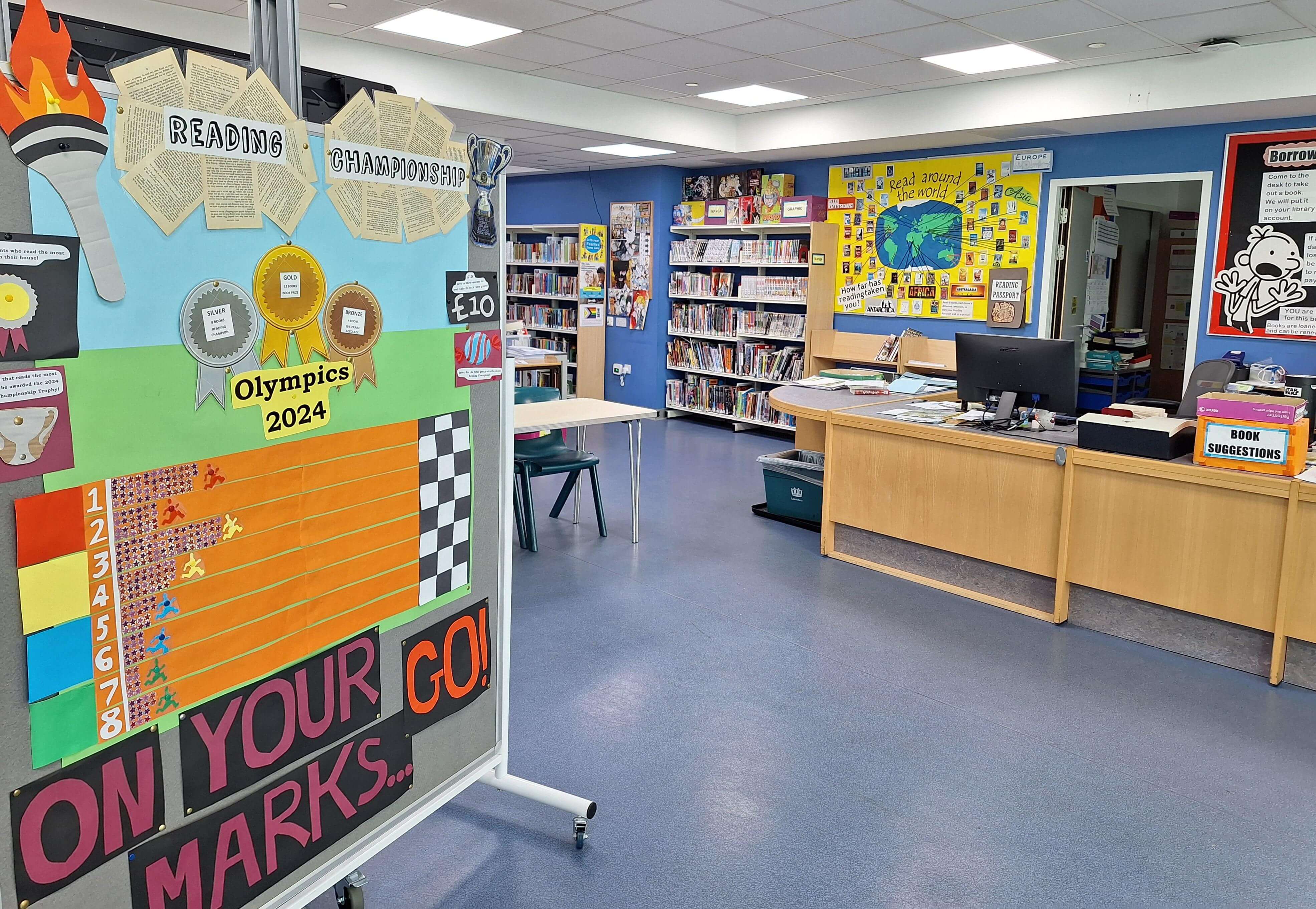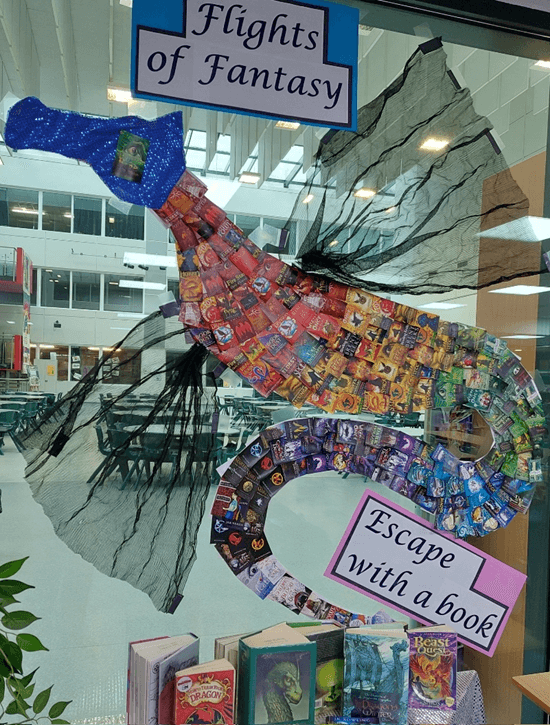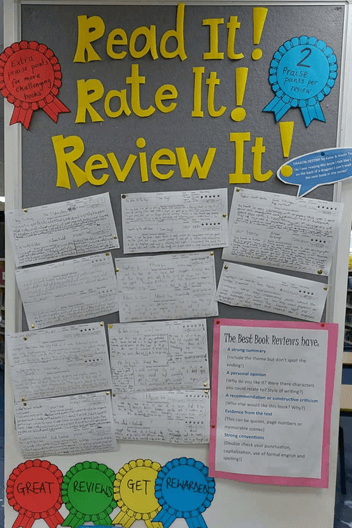In this blog we’ll be looking at what today’s school libraries contribute to the schools they are a part of, the impact they have on pupils and where they’re going in the future.
This time, we gain insight into the library at Forest Hill School, London, by speaking to Librarian, Karen Hans, Headteacher, Michael Sullivan, and Chair of Governors, Keith Knox.
Firstly, Karen shared the current school library provision and her plans for the future.
Could you give us an outline of the school library provision at Forest Hill?
We are blessed with a lovely, light library space which is next to the school reception and also forms one side of the central school atrium. When the school was rebuilt the library was deliberately put front and centre, reflecting the importance of reading.
We have c11,000 physical books, also ebook and audiobook provision. Our AccessIT Library Management System has a great WebApp for pupils and staff to use to search for books, reserve, review them and much more.
We have weekly library lessons for Year 7 and 8 pupils, with half-termly sessions for Year 9 pupils. We are open every lunchtime across the split lunches, two days being a quiet space with activities such as colouring, jigsaws and origami and on the other three days we provide games such as chess, connect 4, Banana-grams, snakes and ladders, triominos and draughts. We organise author events, World Book Day activities, an annual Reading Championship and take an active part in the Lewisham Book Award – all of which are designed to encourage reading for pleasure. We are also involved in information literacy initiatives with various departments and the 6th Form.
We have two full-time staff: myself and an assistant. This enables us to work in depth with pupils during library lessons, leading small groups or working 1:1. A buddy reading scheme means that older pupils come to the library to hear younger pupils read and Year 12 pupils volunteer to help in library lessons.
After school we host homework club, Creative Writing Club, Dungeons and Dragons Club and lead “Book Chat” – whose members are currently very much enjoying reading The Hitchhiker’s guide to the Galaxy aloud together.
We have a lovely group of library helpers and take these and other pupils on trips during the year, for example to the Fantasy Exhibition at the British Library.
What are your plans for the library for the rest of this year?
We have a Year 7 Chess Championship to run this term and possibly a Year 10 one as well. This year we will be hosting the Lewisham Book Award event for our local schools and taking pupils to compete in the Lewisham Book Quiz.
Our Reading Championship runs during the summer term, culminating in a big award ceremony assembly. We also deliver an Empathy Day assembly with the school counsellor and we have two author events booked for the end of the summer term. In Year 7 library lessons, we will arrange for our local librarian to come in and speak about the public library service and I will be designing a lesson on Propaganda for Year 9 pupils that the English department will be trialling at the end of summer term. At the end of the summer term I am planning to introduce a 3 week library lesson research project.

Which departments do you work with?
All departments at various times, but these more regularly: SEND and EAL as we liaise over the reading needs of individual pupils, English as library lessons are part of the English curriculum offer, Maths and Science as we liaise over disciplinary information literacy lessons, History as we have recently done an extensive review of books supporting their curriculum and designed relevant posters and bookmarks.
What are your training priorities for this year?
Improving our knowledge of phonics teaching, attending the SLA conference and completing the L5 Operations and Departmental Management apprenticeship I am enrolled on with the National College of Education and Chartered Management Institute.
Do you have pupil library helpers, and if so what do they help you do?
Yes, we have built up quite a team again after Covid, which meant we couldn’t have pupil helpers at all for a while (and then we only had Year 7s - as the library was part of the Year 7 ‘bubble’).
We also have Duke of Edinburgh volunteers and sometimes the two overlap. They shelve, tidy, process books, withdraw old books and sell them to raise money for Book Aid International, help with displays, help run the chess championships and generally help create a lovely atmosphere in the library!
What’s the impact on them?
Apart from enabling them to gain praise points (and this is always a draw for some!) the helpers form a community within the library, able to meet like-minded pupils from other tutor groups and year groups. Their confidence develops and most take their responsibilities very seriously, many enjoy coming after school to help as well as at lunchtimes.
They are taken on trips such as the SLG Pupil Helper Day and to venues like the London Metropolitan Archive to understand more about the role of libraries in society; one of our Year 10 pupil helpers is now interested in becoming an archivist and another was a finalist this year in the Pupil Library Assistant Award.
What (if anything) did you do before becoming a librarian, and how do those skills help you in this role?
My first degree is in Social Science, which helps with the Information Literacy side of the role. I spent a year teaching in a secondary school in Turkana, Kenya, which brings home to me how fortunate our pupils are to have the facilities and resources that they do.
I spent many years as a library assistant, in a variety of sectors, including higher education, before taking the plunge and qualifying as a librarian. As a library assistant I worked with some inspiring librarians and was exposed to many of the basic skills needed for a library to run smoothly, such as ordering from library suppliers and following financial procedures, covering books well, cataloguing and classification rules, user education and customer service. Obviously, my overall skills and training in librarianship is useful for this role but my previous work has also helped me expect the unexpected and how to be good listener and problem solver. I enjoy helping others and finding the right answer to whatever the problem is!


Next, Michael explained why the library is such an important part of their school and why it's worth the investment...
What impact does your school library have?
The library is a fantastic resource for all students and staff in school. Our younger students benefit from dedicated reading lessons in Y7 & 8 as part of their English offer. This helps build literacy skills and a love of reading. Our librarians also organise author events regularly in school.
Further up the school teachers can use the library or its resources as part of their curriculum, and to enable students to strengthen research skills. In addition to this, the library is open to students at lunchtimes for clubs and other activities, as well as after school for homework club and before school for peer-supported reading.
Forest Hill would not be the thriving and aspirational school it is without the richness the library brings to our environment.
There are many competing demands for budget and staffing. Why does Forest Hill invest in the library?
It’s money well spent in our opinion. Building strong literacy skills and a love of reading is fundamental to preparing students for success as they progress through their education and, indeed, their lives. We see it as a key part of instilling in students a love of learning which will serve them well in a world which is changing increasingly quickly. Adaptability and a willingness to learn new skills is something the library can be at the forefront of developing in students.
There may be people reading this and wondering if their school library is good… for you, what are the key indicators of a good library?
For me, the chief indicator is the enthusiasm with which students embrace the opportunities offered by the library. This can manifest itself in may ways including the level of engagement in library lessons, the numbers attending lunchtime and after school activities in the library, the numbers of student library assistants and the range of activities offered to students by the library.
Feedback from students, parents and visiting authors is also a good measure. I’m pleased to say that, for our library the indicators could not be better!
The SLA is looking to build strong school libraries for the future – what do you think the role of school libraries will be in 5-10 years?
I think that the fundamental role of school libraries will remain the same; namely to support literacy and learning skills development and to instil in students a love of reading. Of course, the methods used to do this, and the technologies embraced to make it relevant and engaging for students, will inevitably change and improve. The core business of the school library, however, will remain the same.
And finally, Keith echoes the positive impact investing in the school library has on Forest Hill...
What impact does the school library have?
When the school was rebuilt it was very important that literacy was at the heart of the school. The new library was built at the core of the building so that literacy was always at the forefront of the curriculum.
There are many competing demands for budget and staffing; why does FHS invest in the library?
We invest because it is important that our boys get the experience of reading and shows them that literacy is important. We use the library extensively and it is a place where a lot of our boys will not experience elsewhere.
There may be people reading this and wondering if their school library is good… for you what are the key indicators of a good library?
Obviously results are important and improvements in literacy does affect results in a positive manner. As a boy’s school it becomes more important as a place of quiet study and where it will contribute to our boys leaving the school with a positive view on reading and literacy.
The SLA is looking to build strong school libraries for the future – what do you think the role of school libraries will be in 5-10 years?
Our library will still be important although, with changes in technology, how we provide this service will obviously change. Whatever the platform the boys use, reading and literacy will still remain important.
For more resources on why school libraries matter, click here.
The School Library Association (SLA) is a charity which supports schools develop their school library, establish a reading culture and deliver independent learning skills. We believe that all schools should have their own (or shared) staffed library to help all children and young people fulfil their potential. To support our work please donate here.